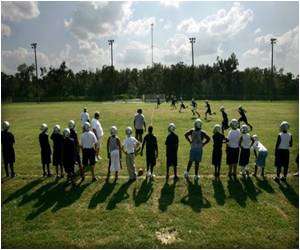
"Cognitive fallacies can affect all of us, even if we are considered expert performers in a particular field," says Patrick Haggard of the University College London. "It is important to try to be aware of situations in which we may be vulnerable to bad decision making. Then we may be able to avoid making mistakes."
For example, Haggard and Erman Misirlisoy say, at a casino roulette table it's not a good idea to place a big bet on black simply because there have been several reds in a row. Previous events aside, red and black are always equally likely. The natural tendency to suspect otherwise is known as "gambler's fallacy."
Haggard and Misirlisoy are generally interested in how people make decisions, and they recognized soccer and other sports as great examples of competitive cognitive strategies at work.
"In a penalty shootout, a goalkeeper and a group of kickers do their best to outwit each other," Misirlisoy says. "How they control their behavior gives an insight into cognitive strategies more generally. Just as a kicker and a goalkeeper need to decide between kicking left or right and diving left or right, we often find ourselves in life making decisions between two roughly balanced options, such as two alternative routes to where we want to go."
As is often the case in sports, goalkeepers can't wait until the ball has been kicked to dive or they'll miss it every time. They simply have to guess. The best strategy for both goalkeepers and kickers is to behave unpredictably, diving and kicking in random directions.
Advertisement
What's a goalkeeper to do? Misirlisoy suggests that it might be good strategy to decide on a random sequence of dives before the game and follow that sequence regardless of what kickers do. Until that day comes, kickers could learn to predict which way goalkeepers might dive.
Advertisement
Source-Eurekalert








